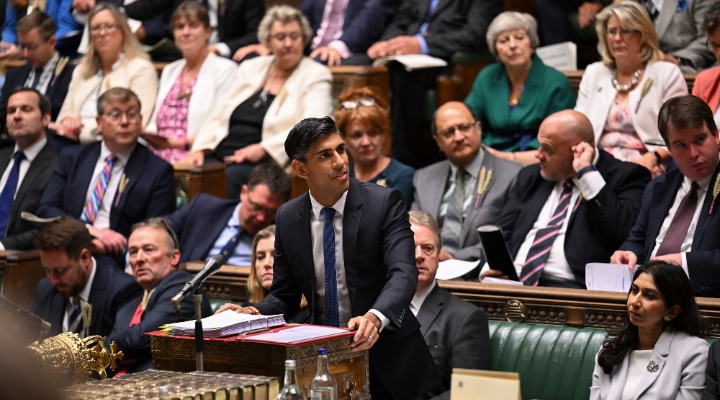
Last week's Autumn Statement was very...business-y.
Tax cuts for the private sector were the centrepiece of the 110 growth measures announced. In the same breath, Britain was described as "Europe's most innovative economy".
But is it the greenest? Probably not, after a September U-turn on key climate change targets, most notably a delay to the ban on petrol and diesel cars from 2030.
As focus groups probably tell the ruling party every week, net zero has dropped below the cost of living on the average briton's priority list, if it was ever above it in the first place. Fiscal events are always designed to match the mood of voters, so unsurprisingly there wasn't a huge push for climate change mitigation measures. The environment is still important, of course, but times are tough and the Conservatives have an election to win.
Or so goes the logic.
The first mention of green energy came some way into last week's speech under the auspices of "infrastructure, housing and planning". Loosening planning restrictions – making it easier to build houses and overcome "NIMBY" objections – are the main thrust of this package, which also takes in electricity grid access.
"It is taking too long for clean energy businesses to access the electricity grid," Hunt said, adding the findings of a review by Electricity Networks Commissioner Nick Winser had now been published. The idea is now to revamp up the grid network that supports renewables such as wind and solar, as well as electric vehicle (EV) charging points. Electricity demand is expected to soar in the coming decades across the world, so perhaps it was a sensible move.
Apart from the obvious incentive for people living close to grid upgrades, it did feel like a subsidiary of the day's main business, however. Namely, more money is being targeted at the "Green Industries Growth Accelerator". You can do your own research about what this actually involves, but the exciting title perhaps tells you all you need to know about where it scores on the style-versus-substance scales.
And, as the saying goes in frontline politics, there are no new ideas. Like many "green initiatives" announced at such events, many aren't aren't actually new at all. Moreover, commentators implied they were "broadly welcome" but failed to go far enough.
Dan Parker, partner at consultancy Newton said: "the clean energy measures from the chancellor are a step in the right direction and could go a long way to helping renewables and crucially offshore wind successfully deliver on their potential for the UK. But we must get the balance right between quality and pace."
Cash for Qashqais
In the chancellor's main speech, green energy was lumped together under the £4.5 billion package for the wider manufacturing sector, but this does include £2 billion investment in automotive sectors. Nissan has pledged an identical figure for its car plant in Sunderland, where the "pure electric" Qashqai model is being produced.
These measures seem hard to argue with; the Qashqai is one of Britain's most popular cars and the Sunderland car plant, while also providing jobs in a less affluent area of the UK, also exports 80% of its production. It's where loving the planet and levelling up meet.
But if electric car sales are so important to the chancellor, why did the government just two months ago change the deadline for the phasing out of petrol and diesel cars from 2030 to 2035? Fuel duty was also frozen again in the autumn statement, shielding drivers from the worst of the pain at the pump, especially as oil prices have risen again. Still, the 2035 deadline brings back into line with the EU.
Pain Free Net Zero? No Such Thing
This balancing act is one most European governments have to make; aiming for net zero and investing in domestic renewable industries, while also trying to shield citizens from the inevitable costs of that journey. Not all of them are going to get it. Some will suffer electoral defeat. UK asset managers, hardly known for their radicalism, were clear in September when they said the u-turn was the wrong decision.
"The short-termism of allowing UK's cumulative emissions to increase for sake of cost does not take into account the medium-long term impact on taxpayers wallets due to increase by three fold in 2050 with increased affects of climate change," Ninety One said at the time.
"The incoherent approach means our long-term ambitions to reach net zero becomes less likely".
Thomas Hansen, Gulf Investment Bank AM fixed income portfolio manager, agreed the messaging was confused.
"It is worrying how the decision is being framed as helping with the cost-of-living crisis. Hopefully this narrative will not serve as a template for more populist governments around the world," he said.
Renewable investors like to plan ahead and shifting deadlines creates the wrong "optics" for external asset allocators and domestic businesses trying to make decisions. As Guy Anderson, manager of the Mercantile Investment Trust (MRC) put it, the short-term damage may not be significant in practice now, but will have wider implications later on:
"The government's U-turn, whilst not directly material to many UK companies, does increase uncertainty for businesses when planning ahead," he said.
Can We Afford It?
So the Autumn Statement didn't exactly shift the UK government's position dramatically after September's reversals; it just slotted into the bigger narrative about what the UK has achieved economically in the last 13 years under one party; in some respects, we're ESG leaders, in others we're laggards. I looked into this political dimension in more detail in October in my article How Green Are the Tories?
"Business needs stability and predictability," NetWealth economist Gerard Lyons said after the chancellor’s statement. There isn't an awful lot of that around at the moment. But a general election could provide some, at least. Simultaneously, nobody is pretending a new Labour government (as opposed to a New Labour government) wouldn't be constrained by poor fiscal forecasts and the now-entrenched call to cost every single manifesto commitment, however.
Nor is there really any political appetite for a US-style Inflation Reduction Act, despite how painful the headline rate of inflation has been. We can't afford it either. Debt incurred during the pandemic and in the energy crisis will still need to be paid off. Energy bills are still set to go up again in January 2024. If this sounds too gloomy, there is still the potential for pension fund reforms to unleash a wave of institutional backing for renewable industries. The only thing is Jeremy Hunt and Rishi Sunak may not be around to see this bear fruit.



























